Here in the 22nd century, we have rediscovered the importance of honoring nature, including the nature of each individual person. Everyone has an individual gender identity and their own unique way of expressing their sexuality. Some of it is based on procreative drive, some isn’t, some of it is more about a creativity that has to do with culture and the social settings and structures we live in so it becomes more about caring for ourselves, each other, and the earth, than perpetuating the species, which is very important, but it is not about the need to procreate in order to dominate.
Mx. Justin Vivian Bond
Download interview in PDF format ![]()
An Interview with Mx. Justin Vivian Bond
February 25, 2011
Justin Bond’s Apartment in New York City
Mx. Justin Vivian Bond in TN, photo Carlos Motta
Mx. Justin Vivian Bond: My name is Mx. Justin Vivian Bond, and I am an artist. I am a performer, a singer/songwriter, a writer and a painter. I live in New York City and we are in my apartment in the East Village.
Carlos Motta: During your show last Friday at Joe’s Pub, you performed Nina Simone’s song 22nd Century. Let’s imagine we are in the 22nd century today. What is the world like regarding issues of gender identity and sexual difference?
JVB: Here in the 22nd century, we have rediscovered the importance of honoring nature, including the nature of each individual person. Everyone has an individual gender identity and their own unique way of expressing their sexuality. Some of it is based on procreative drive, some isn’t, some of it is more about a creativity that has to do with culture and the social settings and structures we live in so it becomes more about caring for ourselves, each other, and the earth, than perpetuating the species, which is very important, but it is not about the need to procreate in order to dominate.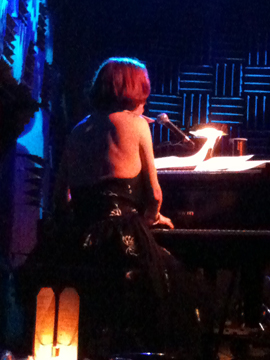
Mx. Justin Vivian Bond performing at Joe's Pub on Feb. 20, 2011
All photographs in this interview by Carlos Motta
CM: Since we were both born in the 20th century, it seems we have lived a very long time! I remember the things you just mentioned were not quite like that back then. How did we get here? How did we change?
JVB: Things are changing very quickly because the earth and people have to adapt, and in order to survive we had to make some big changes.
CM: When were you born?
JVB: I was born in 1963.
CM: And where were you born?
JVB: In Hagerstown, Maryland.
CM: What was life like in Hagerstown for you?
JVB: It was very rigid. It was a town where people were very conservative, and there were a lot of fear-based religious beliefs. I think this has a lot to do with people being afraid of dying, being alone, and being afraid of the unknown. Certainly when you are in a place without much diversity, where everybody tends to emulate each other in order to fit in, when people step outside the norm, they become the unknown and they are feared. I think I lived in a difficult place, but I got out as soon as I could.
CM: How did you come to realize that your gender identity was fluid or varied, and how did that manifest itself at first?
JVB: I was a pretty joyful child. I liked dancing and expressing myself by wearing things that were glittery. I guess you could say I liked adorning myself. I was constantly being told that I was a boy and that boys didn’t do the things I did. I couldn’t understand if I was a boy why I wanted to do the things I wanted to do so I started to think in terms of not really being a boy. I was aware of the fact that people were trying to put something on me that didn’t feel right from a very early age. I didn’t quite have the words to express what it was, but I knew I was different. I knew what I felt was true and that what people were telling me wasn’t true, at least not for me. So it became a constant negotiation with how I could be true to myself, stay out of trouble, and not be harassed. I started questioning the status quo very early. 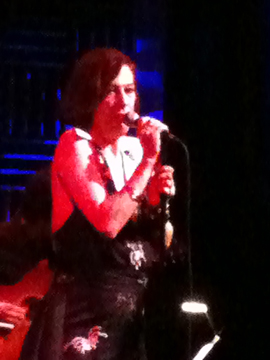
CM: When were you introduced to the rigid idea of the gender binary? Did you ever feel you were a woman as opposed to a man?
JVB: I never really felt like I was a woman although at certain times in my life I felt it would have been easier for me if I had been born a woman, because I have a much stronger identification with things that are described as femme. I like pretty things. I was sexually attracted to boys but I felt most comfortable and most at home with girls. If I could have had my wish, I would have wished everybody else would change so I could feel comfortable. Now that I have gotten older, I don’t think that is necessary, but I am transgendered and so I sort of float back and forth. I don't believe in the gender binary anymore, I am just kind of exploring a place where I can be as true to myself as possible physically and emotionally.
CM: At an early age and into your teens did you find a place in which you saw your identity reflected in some kind of way in pop culture or literature for example?
JVB: I was definitely comforted by female singers and their music. I initially enjoyed a softer kind of expression and when I got older I became angrier so I had an affinity with punk singers like Marianne Faithful and Patti Smith, people who had strong, kind of subversive messages. Of course I was always attracted to the glamour of Hollywood movie actresses because of the way they dressed, because many of them projected a strong image and they had careers. I was also always very interested in women writers that wrote their own narratives, like Lillian Hellman, or Joan Didion, people that had very strong voices and who seemed to determine their own path.
CM: Were you already aware at this point of the political dimension of gender?
JVB: No, I hadn’t really become aware of gender politics, aside from feminism, which I was very interested in from the time I was maybe six or seven years old. I believed, in my child's mind, feminism was saying that men and women were equal and so I thought that if men and women achieved equality then it wouldn't be so important for men and women to stick to their assigned gender roles. I think at some point feminism lost track of itself because of the homophobia when many lesbians got involved with feminism and became kind of a rift in the movement. The mainstream culture played up that rift and then there was the fight for the Equal Rights Amendment in the mid 1970s, which was voted down. Then I became more aware of the opposition.
In 1980 when Ronald Reagan was elected primarily because he catered to a fear-based Christian voice, the moral majority sort of came in and hijacked American politics and I became aware of their determination to make sure that people remained ignorant. They wanted to cut education, start arguing about science, and take everything from logic to turn it into end-crazy dogma that was based on faith but had no basis in reality. Religion and politics became basically the same thing. The separation of Church and State started to be eroded.
Then there was the AIDS crisis, which was the wake up call for queer people of my generation because it became very clear that our government wanted us dead, and would do nothing to protect us. There had been the gay rights movement that started in the 1970s and people had started coming out and fighting after Stonewall. But people began to literally fight for their lives in the 1980s. I got involved in Queer Nation in San Francisco and met playwright Kate Bornstein, who put me in her show, “Hidden: A Gender,” which started to give me the words to articulate my gender, my ideas of how I wanted to express myself. I became much more political in my twenties.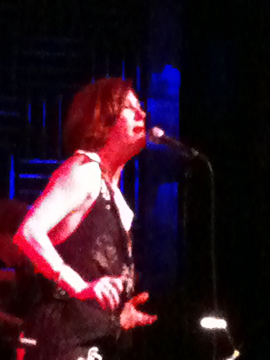
CM: When did you turn to performance and art as a way of making a living?
JVB: I was always interested in performing. I always loved singing and I grew up in a church in Maryland that was very accepting of me even though they didn’t quite know how to accept me, but I felt safe there. I wasn’t harassed or attacked, so I would do a lot of performances with the youth choir and Christmas pageants, and got involved in the community theater when I was in my teens. I found that when I was painting, drawing, writing, or performing I was in control of what I was presenting to people because if I would be walking down the street or if I was at school I never knew how I was being perceived. When I was on stage performing I knew exactly what I was putting out, and people seemed to respond positively to what I did. I have never felt safe in a crowd, but I have always felt safe in front of one.
CM: When did you get out of Maryland?
JVB: I graduated from high school in 1981 and I was gone three days later.
CM: Where did you go?
JVB: I went to spend the summer working at the beach in Delaware and then I went to college at Adelphi University in Long Island, New York.
After I graduated from college I lived in New York for a while, but I thought I wanted to be an actor. I had been trained and had the technical skills to be an actor, but I hadn’t really found a voice and wasn’t completely sure I was talented. I wanted to go someplace where I could get work and really find out. I moved to Washington D.C., which was near where my parents lived and I did some shows there and discovered I had talent as an actor, but I didn't really want be one.
CM: What kind of shows were you doing?
JVB: I was cast in other people’s shows. I did some dinner theater and then I was in a play about the Siamese twins Chang and Ang. I was one of the Siamese twins. It was a real acting challenge and I was proud of the work I did. Then I got called back for the Folger’s Shakespeare Company, but by the time I got that audition I was ready to move on. For my audition for Folger, instead of doing a traditional audition piece like Lysander, or one of those young leading men of Shakespeare, I decided to be Cleopatra. They said it was very interesting, but did not cast me. Shortly thereafter I moved to San Francisco to try and establish residency in California so I could go to a state school and get a degree in art history. There I met some other queer performers and discovered that queer performance was where I could have a voice and create my own work.
CM: It seems like in Washington D.C. you began to understand that expressing ideas of gender identity on stage could be a way of making work?
JVB: I think I discovered that I wasn't interested in trying to figure out what other people expected of me. For auditions or in order to be a successful actor, I realized I would have to step outside myself and become something that was calculated to please other people. I just couldn't live that way anymore.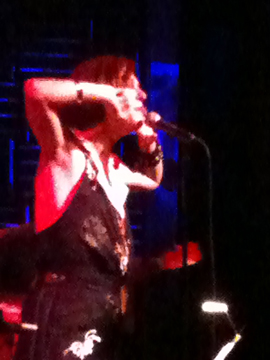
CM: Arriving in San Francisco, at what point do you realize you could use your body as a form of expression, or more importantly perhaps, as a political instrument?
JVB: I had always had a lot of internalized homophobia because of the way I was raised. When I moved to San Francisco I found a community of Queens for the first time. Here was a group of other boys that were not exposing themselves in ways that were oppressive and I began to discover how by loving them, I was able to love myself. I just started to just free up my body. I let my hair grow, I got my ears pierced, and I started wearing different clothes. I just became much more androgynous and eventually a lot more comfortable with my feminine side. I started to feel attractive for the first time in my life, and to blossom in a way that was very visible because I was not trying to hide. By expressing myself, walking down the street, twenty-four hours a day, I became myself. I had always been stared at because I was different, because of the way I walked, or for various reasons. I remember one time my girlfriend said it was so strange to walk down the street with me because everywhere I went people stared. She asked me what it was like and I was surprised because I had become accustomed to not paying attention to how I was being perceived. It was a wake up call and I realized that I was making an impact just by walking down the street; I was making a political statement.
I remember one time walking down Market Street, some guy screamed, “Hey Baby,” at me because I was looking very femme. I don’t know if he mistook me for a girl, or for a tranny, but he was coming on to me. I ignored him, so he screamed, “Bitch,” and when I turned the corner someone else started calling me “Faggot.” On one corner I was a victim of misogyny and on the next corner I was a victim of homophobia, which are really the same thing. No matter where I go it is confusing to people. It is not so confusing to me. What is wrong with people?
CM: When you say you connected with a group of Queens in San Francisco at the time, are you referring to Drag Queens or to a range of different identities?
JVB: Some were Drag Queens, some were just outrageous, really empowered, queer boys that were smart and assertive about whom they were. They weren't making apologies or trying to be gender normative, gay men. They weren’t like Muscle Mary’s, or Sweater Queens, they were more anarchists or punk, more aggressive about who they were, but funny and lovely, not arrogant in any way; just accepting and pithy.
CM: Beyond that fluid performance of gender and identity in this group, how did you come to terms with your sexual desire?
JVB: I guess part of being comfortable with your sexual desire is getting to a place where you can allow yourself to feel desired.
I became more comfortable with my sexuality when I became more comfortable with what people desired in me. Initially, I felt in order to be a gay man, I had to act certain ways for other gay men to be attracted to me. I was constantly trying to figure out how I could be attractive to other people. When I finally just became myself and people were attracted to me, then I became more comfortable with my own desire. It is desirable to be desired, but it is also a relational exchange that allowed me to become more aware of who I was actually attracted to in a way that would satisfy me, as opposed to some sort of objectification of some ideal, which I think most teenagers go through. I then started to look at people as human sexual beings instead of pictures in magazines or whatever. 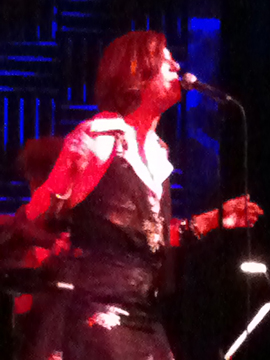
CM: What was the scene in San Francisco at this time in terms of queer public spaces and public sex?
JVB: There were places, sex parties and a lot of cruising in parks. There was sex in clubs, but the places I went weren’t necessarily places where there was a lot of public sex. In dance clubs and queer clubs you would totally make out with people and get off in the bathroom or whatever, which I always enjoyed, but when I moved to New York in the 1990s, there were still back rooms in many of the bars. I have always had a desire for intimacy, so I would do acts of public sex on stage and in clubs, which was fun as an exhibitionist. That was exciting because on stage I was in control, but I was never really comfortable in a dark back room having sex with someone when I wasn’t sure what was going on. I don’t know if I was too insecure, or whether it just didn’t appeal to me very much.
CM: In terms of your performances, how did you meet your collaborator “Herb” (from "Kiki & Herb") in San Francisco and what kind of work began?
JVB: I wanted to do a lounge act because I loved Julie London and was really interested in classic 1950s glamour. I loved the songs of the back-rack 1960s era feel, that kind of lounge thing. But I also wanted to update it and sing modern indie rock songs within that style, so I was trying to find someone to work with. The boy I was dating suggested I talk to his friend Kenny. I went over to Kenny’s house and we played some Jacque Brel and Leonard Cohen songs and just practiced, hung out, and got to know each other musically. Then I got a gig to do a show I wrote called, Dixie McCall’s Patterns for Living, in which I played myself. Kenny did it with me and it was very successful. We started performing around under our own names, Justin Bond and Kenny Mellman, doing lounge versions of popular and rock music in straight and gay clubs in San Francisco.
“Kiki” initially emerged when this guy asked me to perform at his birthday party. It was raining, I was really tired and I had been going through this moment of dealing with fags that constantly had their way of approaching transgender people and Drag Queens with this whole stereotype that we were bitchy and mean. I always felt they were casting me as that and found it offensive because it just had nothing to do with whom I was. This particular night, I was smoking some pot and I was angry because someone had said something to me that hurt my feelings or whatever, so I said alright: “If these Queens want a bitchy, fucked up diva, I will give them one!” I put on this make up, and this scary wig, and I drew lines on my face. I had never before stuffed or wore fake boobs or anything, but I put on these great big knockers, you know, and I showed up at this party and I just came out like I was drunk and crazed and did this over-the-top insane crazy Queen and reeked havoc at that party. Of course they loved it, and it was fun because it was cathartic in a way.
At the end of the gay pride march, I hosted the main stage at the Festival of Pride as myself and that same night, Kenny and I had a gig and had been marching in the parade and singing and screaming all day long. I just really didn’t have much of a voice, so I said: “Alright, tonight we’re going to do our material, and I’m going to be Kiki and you're going to be Herb and we’re going to be this down and out lounge act and we’re just going to go for it because I can't sing, and I can't be pretty tonight.” I did the character. It was in a straight club and all these people just went crazy for it. We got a standing ovation. I wanted to do more of it because it gave me an outlet. It was much easier for me to be honest. It was at a time when a lot of my friends were dying and I had all these things I wanted to say politically that may have seemed shrill coming from a 28 year-old. I made “Kiki,” a 66 year-old “seen it all,” “done it all” alcoholic woman, which allowed me to get away with a lot more and make more political comments in this humorous way. I was far enough detached from that it wasn’t so earnest and could get everything I wanted without alienating people. “Kiki” became a mouthpiece for my political agenda. 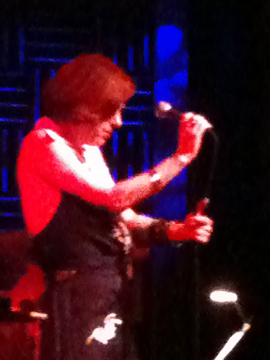
CM: What politics were you responding to and what was your political agenda?
JVB: As “Kiki” I railed against Reagan and Bush. I railed against the war. I took on homophobia by talking about creating a gay son for myself. I talked about women's issues, as a woman who had her children taken from her because she was too wild. I could say everything in this crazy way because people would understand my character as a drunk. One of the classic lines was: “The saddest day of my life was the day John Hinckley missed when he tried to assassinate President Reagan,” and then I would go off in this dirty rant about Reagan. It was funny.
CM: What or who was “Herb’s” character modeled after?
JVB: When we first did, Dixie McCall’s Patterns for Living, we played in a Greek restaurant on Valencia Street and there was a great Mexican pianist there named Eddie, who was beautiful. He was old and he would sit at the piano and drink tequila and play piano all night. He was real “show-bizzy,” but a sweetheart. He had a cat that he loved that was dying and he would start crying when he talked about it. He was the sweetest thing: A little downtrodden with a great spirit. We based “Herb” on Eddie.
CM: How long did you perform together?
JVB: I believe we performed together from 1991 until 2009.
CM: Why did you separate?
JVB: For me it was a time to move on. I couldn’t really see what else I wanted to do with that character. I had taken her from clubs in San Francisco, to Carnegie Hall twice, and to Broadway. I had expanded her narrative from being born in the 1930s to being alive before Jesus and being immortal. I had made this long story of them in the manger. The cow in the manger ate the afterbirth of Jesus, making the cow immortal and then “Kiki” and “Herb” drank the milk of the cow. The milk of the cow unbeknownst to them made them immortal as well so they had been alive throughout the previous two millennia. I was no longer limited to seventy years of life but could place “Kiki” across time. She went out on dates with Hitler and was in France for the French Revolution. It was fun to make all these jokes and stories about any time throughout history after the birth of Christ.
CM: Did “Kiki” eventually die, or she is still alive?
JVB: Oh, I don’t know, she disappeared. She has gone on. I think they reinvented themselves and are living somewhere else. They weren’t lounge singers for 2000 years. Every now and then they get discovered and then they have to go underground again. I guess that is where they are.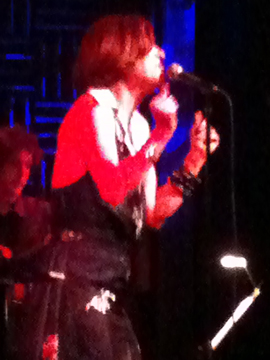
CM: You are now performing as Justin Bond. How is Justin Bond different from “Kiki” in the way you are approaching both singing and politics?
JVB: Obviously “Kiki” was very over the top and her story wasn’t my own. I am now being myself and telling my own stories. I created this voice for “Kiki,” which was distinct and uniquely her own. I decided I needed to rediscover my own voice so I started writing my own songs and choosing carefully whom I collaborate with. I have been working with a variety of musicians. I still operate in the same classic cabaret structure that weaves between songs and stories to build a set in such a way that hopefully doesn't get boring. Within this structure as Justin Bond, I sing my own songs tell my own stories and I am free to integrate all my various work. I have been writing and have more time because it took a lot of energy to maintain the characters and to get into that space which I inhabited for a very long time. “Kiki” was angry, frustrated, loud, and she sang not in my natural voice but in the “Kiki” voice. I am a little bit gentler with myself and I think my shows are also a bit gentler.
CM: I enjoy when you sing songs that are not your own and queer the content of these songs. There is something that happens to a Nina Simone or a Karen Carpenter song that provides a completely new reading and space of identification. I really wanted to be Karen Carpenter when I was a boy because I just identified with her. Your performances make this identification possible again.
JVB: It is a lovely thing because it wasn't something I was sure I would be able to do. Obviously my identification with Karen Carpenter and with other singers of the time is very real, so when I sing those songs it is with a real love for these songs and for the person who sang them originally. Like you say the identification is genuine, so I don’t feel like I am emulating anybody. I feel like I am taking the spark of inspiration from what they did and letting it live within me to share with other people who can also identify with those characters. My theory about Karen Carpenter is that she was a victim of the gender wars. Her parents favored her brother over her, she was a tomboy, and she became very insecure about being looked at. When she was brought from behind the drums, where she had become a great drummer, and placed under the microscope as a huge star, the only way to control her life was by controlling her body, which she did through the way she ate and dressed. I think she tried very hard to become this idealized woman, which is again looking outside of yourself to form yourself. That can be crippling, and in her case it killed her.
CM: I have noticed your performances are much more overt about presenting trans in a positive light, as a wonderful opportunity or a fantastical space. When does this start to happen in a much more direct way?
JVB: That started to happen many years ago. When I was younger, I was frustrated at the way trans was received, so I didn’t have the conviction or the strength to continue with it, and I didn't have a lot of role models. I always say that “Kiki” was a capitulation that was easier for audiences to receive even though I, Justin, am a lot gentler, and a lot less in your face. What I say is more challenging to people than when “Kiki” said it. People felt they could recognize “Kiki” and put that character into a box. I think it is much more difficult to do that with me. On the other hand, I am in a place where I have a greater love and capacity to express this and I am not as frustrated by people's inability to receive it. It was something that I was always interested in doing, I just wasn't quite sure how, and now I feel I like it is better for me now. 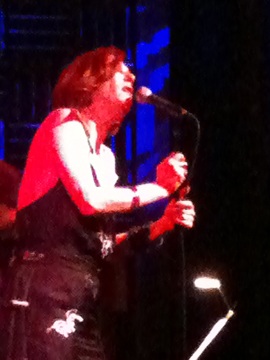
CM: It seems like you have a much stronger degree of confidence and so does your audience.
JVB: Yes, it is a different time.
CM: Because your audience is more prepared to hear the things you are saying even if you shock them?
JVB: The younger generation of queer people is much more comfortable with gender fluidity. We didn't realize at the time, in the early to mid 1990s, that the golden age of queer publishing would emerge, but all these publishing houses were publishing queer literature all of a sudden. Michael Warner put out Fear of the Queer Planet and his book The Trouble With Normal.
Queer theory courses in universities talked about things some of us knew and experienced as our lives, but they were giving it a certain amount of mainstream validity by bringing it to an academic level, or finding a way of explaining queer ideas to a mainstream academic audience. That also trickled down. Then the publishing industry collapsed but queer authors and writers had found their voices so younger people now have these ideas as part of their education and have expanded on and been validated by them. I think I am speaking to a younger audience that gets what I am saying and I learn and I am validated by them as well, which gives me strength and vice versa. It is a really great exchange and I am grateful I have people twenty years younger than me that I can relate to much more deeply and profoundly than a lot of people my own age.
CM: I have been in New York City for fifteen years, and when I first came, there was a bar called Bard’O where Joey Arias and other people performed. When Bard’O closed it seemed like that drag gender-bending underground really collapsed especially throughout the Giuliani and Bloomberg years. I do agree with you that recently it seems there is a gender-bending, performing scene happening again.
JVB: In that time Ru Paul became very successful. Ru Paul had a great voice and message but it was very drag and over the top. It was sort of fashion driven but his success brought a lot of work for quote on quote Drag Queens in New York. I somehow was in that scene, but on the sides because “Kiki” was a more theatrical cabaret singer. I never lip-synced, I always sang with my own voice. When I moved to New York I found it easier to wear boobs, and I did take the easy way on a certain level but I also never really identified as a Drag Queen. When I hosted at clubs like Foxy or Cake, I always introduced myself as your “Tranny Hooker Hostess” because I actually felt like a tranny hooker in those jobs when I was strictly in drag for the money. I had a lot of fun; it was like a role I was playing in that space.
I had so many girlfriends in San Francisco who did identified as Drag Queens and who were much more sex positive in public. As far as public displays of transgressive sexuality, they were amazing. They all died and I felt like I was picking up where they left off and would do a lot of performative sexuality to honor and carry on a tradition I felt was being lost and was under attack by the Giuliani administration and by queers in New York who decided to police sexuality in the gay community. Some queers were also instrumental in getting a lot of public sex places closed down. I felt although I wasn’t someone who had sex in a lot of those places, it was very important for people to be able to make a choice. I felt like queers who were trying to close queer sex places were the equivalent of fundamentalist Christians who are pro-life and I had to take a political stand through my nightclub work. 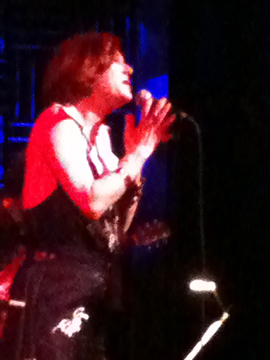
CM: What are your thoughts regarding the normalization of the LGBT agenda, which has mainstreamed queer spaces to the extent that the underground has become less political?
JVB: It is an interesting thing because what is the underground? I don’t know. Sometimes I am still described as underground I don’t think of myself as particularly underground. I am a downtown artist because this is where I work, and there is a certain aesthetic that goes along with that being that we operate without any sort of financial support whatsoever. We aren’t supported by corporations and have no government support. Once in awhile maybe someone will get a little grant to do some work, but we aren't subsidized. Is this why we are considered underground? We are hard working and committed to making art and art statements but I don't really know what an underground is at this point because underground means it is difficult to find. With YouTube and Facebook and the multiple ways of reaching out to our communities and potential audiences, I don’t think anyone can really claim to be underground unless they have completely gone off the grid and they are doing performances in some cave. That is the only way I can see being underground.
CM: What about the idea of the underground as a way of life? For example you also identify yourself as a Radical Faerie, isn’t that somehow an off the grid way of life or at least a statement in that direction? Do you think there is queer scene that is outside of mainstream radar at this point?
JVB: Yes, I think so. There are people who live that way, but I still don’t know they are necessarily off the grid because people are wired to the Internet so the ways of opting outside the sort of traditional economic system and living in ways that don't require so much connectivity.
CM: But there is something about your recent performances, I am referring in particular to your recent performance at The Kitchen, “Re: Galli Blonde, a Sissy Fix,” in which you do present a kind of futuristic, utopian understanding of trans beings. I guess that notion is still in some way idealized in your work?
JVB: I believe in it, idealize it, and I think it exists. The show was based on these people called the Galli who were gender variant priests of the god of Cybele. They lived by traveling and honoring nature, and being outside of gender binaries. They were cast out specifically when Christianity came into vogue and the last temple of the goddess Cybele was burned in Rome by the Christians around 285 A.D. but up until then, they had been part of society. The goddess Cybele was sort of like the greatest competition for Jesus and for Christianity outside of Judaism so the Christians burned the temple and outlawed the Galli, and condemned that kind of gender variant behavior. I think that is where homophobia really began. People that have chosen to live this way have existed throughout history and time and continue to exist. I think the Galli are our ancestors because even though we live in the city, and we have electricity, we are aware of an alternative way of living. I think somehow in the Queer Diaspora we still manage to get together and pass on information to each other. I think it is a wonderful gift to mainstream society that we do.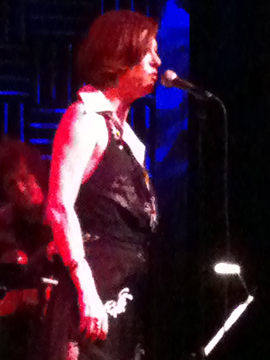
CM: Do you feel represented by the mainstream LGBT movement?
JVB: In certain ways. I think it is wonderful they are fighting for visibility and trying to get health benefits for partners. Personally I have been a big believer in socialized medicine for everyone so it wouldn’t matter whether you are queer or straight, married or single, to qualify for benefits. I don't think anyone should have to get married in order to have health benefits or anything like that. On a certain level I think they are fighting specifically for a gay agenda. I would like to see it be more about social justice for all than struggling for gay people specifically, but I think it is great.
CM: What about specifically organizations working for trans rights?
JVB: I think it is great also. It is wonderful they just changed the law, I think in New York or maybe in the federal government that you no longer have to have surgery in order to get gender confirmed by a doctor, which makes it easier for people to have their gender changed on their passports. Once your gender is changed on your passport it becomes easier in smaller, more local ways to get your gender changed. Of course the gender choices on a passport are still “M” and “F.” If I write male or female, either one, I am lying, because I am neither. I would like to see a “T” in the box, or a “T” and a circle. Let the other two be boxes! I think the more people fighting for the queer and trans agenda, the better.
CM: You have recently added a prefix to your name and also the name Vivian.
JVB: Mx. Justin Bond, instead of mister, miss, or misses.
As far as pronouns, previously, I always went with “he” because it was easier. Now I am at a point where I am more confident to assert what works for me. There have always been attempts within language to find gender-neutral pronouns. I was speaking at a conference on sex and gender and the person introducing me asked which pronoun I would prefer, and I was flustered by the question. He suggested calling me “they” because gender genesis people like to be referred to that way. I told him, O.K., try it. There were two people who spoke ahead of me and when he got to my introduction, I had forgotten our previous conversation and he started referring to me as “they,” and looking over at me. My friend Matt was sitting next to me and I was like, who is he talking about, and then I realized that I was “they,” and thought oh God, that really doesn't work for me. I had to think about it more. There are pronouns such as “Z,” “Hir” and all these different ones that felt awkward to me so I decided I was going to be Mx. Justin Vivian Bond because I felt like it was a more rounded expression of who I am. I then decided to be “V” because I like the way “V” is written with two united sides of equal strength. Also in French “vie” is life. So I made “V” my pronoun. 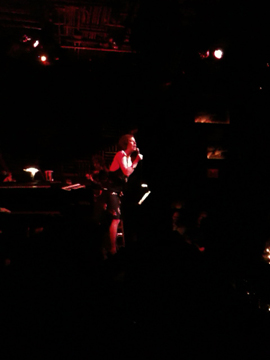
CM: In your show you also mentioned starting Estrogen Therapy, why are you doing this now?
JVB: Throughout my life I have been gender fluid and sometimes identified as more male or more female. But when I was younger, as I was saying earlier, I didn’t have a way out really. I have been very aggressive about saying I am trans in work and life, but other than my work, people can take nothing other than my word for this expression. This is fine but I started to think about when I become older maybe won't have the strength or the energy or the mental facilities to constantly be asserting my transness, so I decided to start making a public and medical record of my transness as well as having my body be the record of my transness. Hopefully, in twenty or thirty years when I am an old person there will have been a lot of changes and a lot more room for trans people in medical establishments and in places where we go to be taken care of when we are old. I do not want to be lumped in with the old men, and would probably prefer to be with old women, or old trans people. I just decided that it was important for me to have a physical and medical record of my transness, not so much for now, but for later.
CM: For the 22nd century.
JVB: Yes. For the 22nd century!
Weblink: Mx. Justin Vivian's Bond website
↑Top
